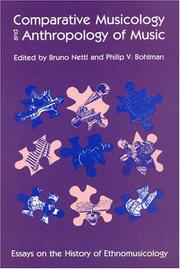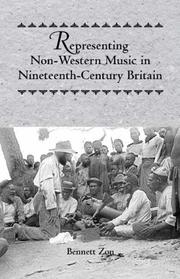| Listing 1 - 10 of 18 | << page >> |
Sort by
|

ISBN: 0226574083 9780226574080 Year: 1991 Publisher: Chicago (Ill.): University of Chicago press,
Abstract | Keywords | Export | Availability | Bookmark
 Loading...
Loading...Choose an application
- Reference Manager
- EndNote
- RefWorks (Direct export to RefWorks)

ISBN: 0292743149 Year: 1993 Publisher: Austin (Tex.) : University of Texas press,
Abstract | Keywords | Export | Availability | Bookmark
 Loading...
Loading...Choose an application
- Reference Manager
- EndNote
- RefWorks (Direct export to RefWorks)
Ethnomusicology. --- Music and anthropology. --- Music --- Social aspects.
Book
ISBN: 1912385317 9781912385317 Year: 2021 Publisher: Canon Pyon Sean Kingston Publishing
Abstract | Keywords | Export | Availability | Bookmark
 Loading...
Loading...Choose an application
- Reference Manager
- EndNote
- RefWorks (Direct export to RefWorks)
This volume celebrates the significant resurgence of interest in the anthropology of music and dance in recent decades. Traversing a range of fascinating topics, from the reassessment of historical figures such as Katherine Dunham and John Blacking, to the contemporary salience of sonic conflict between Islamic Uyghur and the Han Chinese, the essays within Music, Dance, Anthropology make a strong argument for the continued importance of the work of ethnomusicologists and ethnochoreologists, and of their ongoing recourse to anthropological theories and practices. Case studies are offered from areas as diverse as Central Africa, Ireland, Greece, Uganda and Central Asia, and illuminate core anthropological concepts such as the nature of embodied knowledge, the role of citizenship, ritual practices, and the construction of individual and group identities via a range of ethnographic methodologies. These include the consideration of soundscapes, the use of ethnographic filmmaking, and a reflection on the importance of close cultural engagement over many years.Taken together these contributions show the study of music and dance practices to be essential to any rounded study of social activity, in whatever context it is found. For as this volume consistently demonstrates, the performance of music and dance is always about more than just the performance of music and dance. (Provided by publisher)
Music and anthropology --- Dance --- Ethnomusicology --- Anthropological aspects
Periodical
Year: 1996 Publisher: [Bologna] : Study Group on "Anthropology of Music in Mediterranean Cultures" of the International Council for Traditional Music,
Abstract | Keywords | Export | Availability | Bookmark
 Loading...
Loading...Choose an application
- Reference Manager
- EndNote
- RefWorks (Direct export to RefWorks)
Ethnomusicology --- Ethnic groups --- Music --- Music and anthropology
Book
ISBN: 9781443897570 9781443814225 1443814229 1443897574 Year: 2016 Publisher: Newcastle upon Tyne, UK
Abstract | Keywords | Export | Availability | Bookmark
 Loading...
Loading...Choose an application
- Reference Manager
- EndNote
- RefWorks (Direct export to RefWorks)
Opera --- Music and anthropology. --- Anthropology and music --- Anthropology --- Anthropological aspects.
Book
ISBN: 9780691163383 Year: 2012 Publisher: Princeton (New Jersey) : Princeton University Press,
Abstract | Keywords | Export | Availability | Bookmark
 Loading...
Loading...Choose an application
- Reference Manager
- EndNote
- RefWorks (Direct export to RefWorks)
Why do some music styles gain mass popularity while others thrive in small niches? Banding Together explores this question and reveals the attributes that together explain the growth of twentieth-century American popular music. Drawing on a vast array of examples from sixty musical styles—ranging from rap and bluegrass to death metal and South Texas polka, and including several created outside the United States—Jennifer Lena uncovers the shared grammar that allows us to understand the cultural language and evolution of popular music. What are the common economic, organizational, ideological, and aesthetic traits among contemporary genres? Do genres follow patterns in their development? Lena discovers four dominant forms—Avant-garde, Scene-based, Industry-based, and Traditionalist—and two dominant trajectories that describe how American pop music genres develop. Outside the United States there exists a fifth form: the Government-purposed genre, which she examines in the music of China, Serbia, Nigeria, and Chile. Offering a rare analysis of how music communities operate, she looks at the shared obstacles and opportunities creative people face and reveals the ways in which people collaborate around ideas, artworks, individuals, and organizations that support their work.
Musique --- Musique populaire. --- Popular music. --- Music and anthropology. --- Anthropologie.
Book
ISBN: 9781138222137 9781138222144 9781315408583 1315408589 9781315408576 1315408570 9781315408552 1315408554 9781315408569 1315408562 1138222135 1138222143 Year: 2019 Publisher: New York ; London : Routledge,
Abstract | Keywords | Export | Availability | Bookmark
 Loading...
Loading...Choose an application
- Reference Manager
- EndNote
- RefWorks (Direct export to RefWorks)
"[This] book examines key intellectual movements and topic areas in social and cultural theory, and explores the way they have been taken up in ethnomusicological research. New co-author Harris M. Berger and Ruth M. Stone investigate the discipline's past, present, and future, reflecting on contemporary concerns while cataloging significant developments since the publication of the first edition in 2008. A dozen contributors approach a broad range of theoretical topics alive in ethnomusicology. Each chapter examines ethnographic and historical works from within ethnomusicology, showcasing the unique contributions scholars in the field have made to wider, transdisciplinary dialogs, while illuminating the field's relevance and pointing the way toward new horizons of research"-- $c Provided by publisher.
Ethnomusicology. --- Music and anthropology. --- Music --- Ethnomusicologie. --- Musique --- Social aspects. --- Anthropologie --- Anthropologie. --- Aspect social --- Aspect social. --- Philosophy and aesthetics --- Political aspects. --- Social aspects --- Music and anthropology

ISBN: 0226574091 9780226574097 Year: 1991 Publisher: London The University of Chicago Press
Abstract | Keywords | Export | Availability | Bookmark
 Loading...
Loading...Choose an application
- Reference Manager
- EndNote
- RefWorks (Direct export to RefWorks)
Ethnomusicology --- Music and anthropology --- Anthropology and music --- Anthropology --- Comparative musicology --- Ethnology --- Musicology --- 78.30
Book
ISBN: 0253049695 9780253052360 025305236X 9780253049681 0253049687 9780253049674 0253049679 9780253049698 Year: 2020 Publisher: Bloomington, Indiana
Abstract | Keywords | Export | Availability | Bookmark
 Loading...
Loading...Choose an application
- Reference Manager
- EndNote
- RefWorks (Direct export to RefWorks)
How does sound ecology--an acoustic connective tissue among communities--also become a basis for a healthy economy and a just community? Jeff Todd Titon's lived experiences shed light on the power of song, the ecology of musical cultures, and even cultural sustainability and resilience. In Toward a Sound Ecology, Titon's collected essays address his growing concerns with people making music, holistic ecological approaches to music, and sacred transformations of sound. Titon also demonstrates how to conduct socially responsible fieldwork and compose engaging and accessible ethnography that speaks to a diverse readership. Toward a Sound Ecology is an anthology of Titon's key writings, which are situated chronologically within three particular areas of interest: fieldwork, cultural and musical sustainability, and sound ecology. According to Titon--a foundational figure in folklore and ethnomusicology--a re-orientation away from a world of texts and objects and toward a world of sound connections will reveal the basis of a universal kinship.
Music and anthropology. --- Music and folklore. --- Ethnomusicology --- Applied ethnomusicology. --- Sound --- Ecomusicology. --- Methodology. --- Social aspects.

ISBN: 1580462596 9781580462594 9781580466943 158046694X Year: 2007 Publisher: Rochester, NY : University of Rochester Press,
Abstract | Keywords | Export | Availability | Bookmark
 Loading...
Loading...Choose an application
- Reference Manager
- EndNote
- RefWorks (Direct export to RefWorks)
Bennett Zon's Representing Non-Western Music in Nineteenth-Century Britain is the first book to situate non-Western music within the intellectual culture of nineteenth-century Britain. It covers many crucial issues -- race, orientalism, otherness, evolution -- and explores the influence of important anthropological theories on the perception of non-Western music. The book also considers a wide range of other writings of the period, from psychology and travel literature to musicology and theories of musical transcription, and it reflects on the historically problematic term "ethnomusicology." Representing Non-Western Music discusses such theories as noble simplicity, monogenism and polygenism, the comparative method, degenerationism, and developmentalism. Zon looks at the effect of evolutionism on the musical press, general music histories, and histories of national music. He also treats the work of Charles Samuel Myers, the first Britain to record non-Western music in the field, and explores how A. H. Fox Strangways used contemporary translation theory as an analogy for transcription in The Music of Hindostan (1914) to show that individuality can be retained by embracing foreign elements rather than adapting them to Western musical style. Bennett Zon is Reader in Music and Fellow of the Institute of Advanced Study, Durham University UK and author of Music and Metaphor in Nineteenth-Century British Musicology (Ashgate, 2000).
Ethnomusicology --- Music and anthropology --- 78.03 --- 78.03 Muziekstijlen --- Muziekstijlen --- Anthropology and music --- Anthropology --- Comparative musicology --- Ethnology --- Musicology --- History --- 78.34.1 --- 78.31 --- Music and anthropology. --- History. --- Great Britain.
| Listing 1 - 10 of 18 | << page >> |
Sort by
|

 Search
Search Feedback
Feedback About UniCat
About UniCat  Help
Help News
News